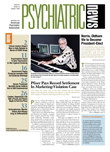“The concept of resilience is becoming a hot topic,” Donna Stewart, M.D., university professor and chair of women's health at the University of Toronto, reported at the annual meeting of the Canadian Psychiatric Association in St. John's, Newfoundland, in August.
Oddgeir Friborg, Ph.D., a psychologist at the University of Tromso in Norway, is a leading resilience researcher, said Stewart. He and his colleagues are testing a Resilience Scale for Adults (RSA) to distinguish people who are emotionally hardy and bounce back from adversity from those who are more vulnerable and must struggle to regain their footing. The military is especially interested in this scale, Stewart said, since “posttraumatic stress disorder is an enormous problem for the military everywhere.”
Friborg and his colleagues also looked to see whether their RSA could predict subjects who may be more resilient to pain. It could, they reported in the August 2006 Journal of Psychosomatic Research. They likewise developed an instrument to measure resilience in adolescents. They found that youth who scored higher on this instrument exhibited significantly lower levels of depressive symptoms, even when controlling for gender, age, the number of stressful life events, and level of social anxiety. Their findings were published in the January 2007 Clinical Child Psychology and Psychiatry.
Meanwhile, resilience research is taking place at the Resilience Research Center in Halifax, Nova Scotia, Stewart reported. It is under the direction of Michael Ungar, Ph.D., a professor of social work at Dalhousie University. The center is bringing together leaders in the field of resilience research from different disciplines and cultural backgrounds. They are using diverse approaches to study how children, adolescents, and families cope with various kinds of diversity.
For instance, the purpose of their International Resilience Project is to develop a better, more culturally sensitive understanding of how youth around the world effectively cope with the adversities that they face. During the first three years of the project, data from some 1,500 children on five continents will be collected and analyzed. Part of the data collection will consist of filming the children in their real-life settings to learn how they successfully deal with poverty, war, violence, parental illness, or other misfortunes.
Some programs that are designed to make people hardier also look promising, Stewart reported. The Public Health Agency of Canada has a program called Nobody's Perfect: Building Resiliency in Canadian Children for Over Twenty Years. For 20 years now, through the program, parents of young children can meet together weekly to discuss their parenting concerns and to strengthen their parenting skills. In Australia, there is the Friends program, which aims to prevent childhood anxiety and depression by building emotional resilience in children. This cognitive-behavioral intervention can be applied in either a grade-school or a high-school setting.
Programs such as these need to be rigorously evaluated, Stewart indicated,“ and once we have found which are effective, make them more widely available.”
And as resilience research gains momentum, hopefully it will benefit psychiatric treatment as well, she added. For instance, it's possible that psychiatrists might eventually be able to use a resilience scale in their practices to help predict patients' responses to treatment. ▪
